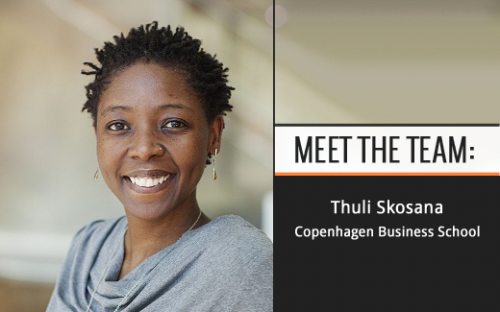This week we interview Thuli Skosana, Admissions Manager for the Full-time MBA at Copenhagen Business School one of Europe's largest business schools.
South African-born Thuli is a graduate of the programme herself so she knows what it's like to be an applicant. She tells us what you need to know about international work permits, mistakes to watch out for in your application, and Copenhagen's secret weekend activities.
Thuli graduated from the MBA in August 2009. She spent a few months in South Africa working for the Cape Town Partnership, an organisation aimed at promoting the city, before returning to Denmark. She joined the school’s MBA admissions team first as a media and marketing consultant in 2011 and then as the Full-time MBA admissions manager in 2012.
As a student Thuli was attracted to Copenhagen Business School's MBA because of its focus on entrepreneurship and leadership, and the school’s location.
What are some of the reasons to study in Copenhagen?
The programme has many special aspects such as the international profile of the students (there are 23 nations represented in the current class of 43 students) and the breadth of experience they bring with them. Our students usually have seven to nine years of work experience with an average age of 33 years.
The professors have a very deep knowledge of their field and links to the business world that they bring into the classroom. The teaching and learning are participative and there is a strong emphasis on the practical application of theory. Group work is a big part of the teaching and this helps students to explore different perspectives while building a substantial, lifelong professional and personal network.
Copenhagen is also a cool city to live in. It has a strong emphasis on the work/life balance. You will also find that the standard of living is very high. It’s a safe and clean city, with incredible infrastructure and you can bike everywhere in the city within half an hour.
What percentage of graduates remain in Copenhagen or Denmark for work and how easy is it for internationals to get work permits?
Between 20 and 40 per cent remain depending on the year. There are very good opportunities in clean energy, management consulting, finance, IT and pharmaceuticals in Denmark so some of our graduates go into those industries. Some students come for the international experience and have jobs to go back to in their home countries. In Denmark, getting a residence and work permit (or the three-year points based Green Card) is a straightforward and transparent process.
Can you give us some examples of job roles and industries that some of your graduates work in?
Our graduates choose many diverse paths when they finish their studies, some end up in IT, others in finance, consulting, marketing, sales and business development and some pursue their own entrepreneurial ventures. For example, one of our graduates from the USA started a nightlife website in Sweden.
Some of the companies that have hired our graduates include Maersk, Carlsberg, Velux, L’Oreal, Siemens, Novo Nordisk, Novozymes, JP Morgan, Hewlett Packard, MAN Trucks and Vestas. These are just a few examples, but the mix of companies and industries also reflects the diversity of the students we attract.
What would you say are the overarching themes of your MBA programme?
Leadership, entrepreneurship and an emphasis on practical skills. Sustainability is also embedded in the curriculum. During the last four months of the program, students work on an Integrated Strategy Project, which is a consulting project where they are challenged to put the theory they learned throughout the year into practice. It is also an opportunity for them to have hands-on experience in the Scandinavian business environment and also to make a good impression in this business world.
What is something you wish applicants did more of or less of?
Firstly, be honest and not give answers that they think you want to hear. And secondly, demonstrate that they have reflected on why they believe your program is a good fit for them and that they are also a good fit for your program, in other words demonstrate that they have researched the school they are applying to. So, in a nutshell, less generic answers and more reflection and depth.
What do Copenhagen MBAs get up to on the weekends?
Weekends are a secret: you’ll just have to come here to find out! It really does depend on the spirit of each class. There was a travelling class who took trips around Denmark and to other countries when they could. Other classes organize events, in and around Copenhagen. Others are more sporty… it just depends. There’s also a big expat and professional community that students can get involved in.
RECAPTHA :
a9
4f
f6
d2







